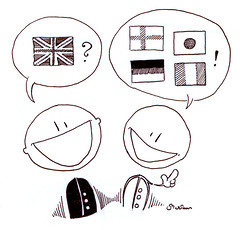 Thanks to Uncle Ben’s kind offer to babysit, we were free to go see a movie (!). The most simple night out becomes something requiring planning and logistics, now that we are parents. However, we almost left it too late to see the latest Harry Potter film before it vanished from cinemas here.
Thanks to Uncle Ben’s kind offer to babysit, we were free to go see a movie (!). The most simple night out becomes something requiring planning and logistics, now that we are parents. However, we almost left it too late to see the latest Harry Potter film before it vanished from cinemas here.
As I’ve said before, we’re not the maddest of mad keen Potter fans, but we have seen every Harry Potter film at the cinema. In order to see the second one, we had to see it in Madrid. Luckily, it was a subtitled rather than a dubbed version!
If I was a mad keen fan, I probably wouldn’t have called it “the second one”, but all the titles blur together. Harry Potter and the Random Jumble of Words. So, this movie was the sixth one, and apparently there are two more to go.
Harry Potter and the Half-Blood Prince
Best realisation of the Harry Potter universe yet.
The sixth Harry Potter book is not the best one of the series, so the sixth movie is starting with a bit of a handicap. If I’m to be honest, it’s a handicap that it doesn’t completely overcome. But, plot aside, there are many other excellent aspects of this film, and I found myself really enjoying it.
The first thing is that the acting has come a long way from the beginning of the series. All the cast put on a good showing, and it is a delight to watch them realise the characters.
I also came away with the impression that the visual effects director was a genius. The special effects in the film (aside from the first couple of minutes in London) were appropriately done, effective, and rather artistic. The quidditch game in this film actually felt like a game that you could imagine people liking.
On the other hand, this is a dark episode in the the Harry Potter series, and is not one you would take small children to. A number of the scenes felt like they could have been lifted from a decent horror flick.
Don’t expect all of the book’s scenes to be present in the film. And don’t expect the book to be faithfully interpreted. If you are a mad keen fan, you probably won’t appreciate it. However, I think they’ve set things up well for the sequel (both of them).
Related articles by Zemanta
- Harry Potter and the cool effect (upyourego.com)
- Film Sweat Extra: And Now, A Layman’s View Of Harry Potter & The Half Blood Prince (philebrity.com)
- Harry Potter and the Half-Blood Prince Tops Box Office (time.com)
![Reblog this post [with Zemanta]](http://img.zemanta.com/reblog_e.png?x-id=3324a6ba-d80f-4db5-919f-8270cb0759de)
